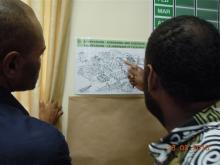Vanuatu Picture Based Climate Change Toolkit

FOR IMMEDIATE RELEASE:
Vanuatu Develops a Picture Based Tool for Teaching Climate Change in Schools
On 28 March 2013, Teachers, NGOs and Government Agencies met to discuss a new picture-based educational tool for climate change in our schools. The objective of the tool is for communicators, educators and teachers, writers of curricula and developers of teaching methodologies to have access to a picture-based outreach tool kit/resource to deliver key learning messages relevant to climate change science, impacts on the Pacific and their country and options to mitigate its causes and to adapt to expected changes.
The SPC/GIZ Coping with Climate Change in the Pacific Island Region (CCCPIR) objective in climate change education is to strengthen capacities of educators to deliver up to date knowledge and skills on climate change in Vanuatu that includes science, changes, understanding impacts and vulnerabilities and developing capacities to mitigate and adapt.
Many resources useful for education on climate change exist, but they tend to focus on the science of climate change and mitigation (greenhouse gas effect, global causes and global impacts). Few education resources address adaptation options, hardly any include impacts of climate change and vulnerabilities specific tailored for the Pacific. At the same time, expert knowledge has grown during the last decade on the impacts and vulnerabilities in Pacific Island countries, as well as on options to adapt to changes expected for a range of sectors (such as agriculture, animal husbandry, fisheries, water and sanitation, forestry, health, potentially infrastructure, etc.).
Personalized and culturally relevant visualisations like pictures, illustrations and cartoons are often more approachable than texts and scientific graphs – this is true for most people, not only to children. Pictures and illustrations convey meaning that words cannot. They accommodate interests of a range of people. Everybody can choose what catches his or her interest. Scientific texts are often intimidating and overwhelming. Pictures allow exploration, creativity and storytelling.
Last week’s meeting allowed stakeholders to discuss their views on a visual outreach tool kit/resource on climate change for education and awareness, based on national and national key learning messages and knowledge products of the Vanuatu Department of the Meteorology and Geohazards. It is expected that educators will use the tool kit/resource in education, and that communicators can use the toolkit in awareness programmes.
The consultation meeting was convened by Ms Virana Lini, who coordinates the Ministry of Education’s cluster group on disaster reduction management for schools. There were 30 participants, comprising: practising Year 7 and Year 8 teachers; representatives of NGOs involved in climate and disaster education; officers from the VMGD, the Ministry of Education and the Department of Agriculture; and representatives of the Teacher’s College, USP and the Curriculum Development Unit.
A presentation on the nature and purpose of the toolkit was offered by Charlie Pierce, the Vanuatu consultant on the toolkit project, who used power point to show the 16 pictures and the Vanuatu Teachers’ Guide. In general, the feedback on the toolkit was excellent and very positive. Participants showed great interest and were well motivated to provide their opinions. All the teachers, in particular, look forward with anticipation to the time when they will be able to use this toolkit with their students.
Teachers felt that the pictures will help students to recognize and implement adaptation activities, and that students will recognize their country and their culture in the pictures. There is a lot of support for further workshops to train teachers in the use of the toolkit and TG, once they have been finalized, an activity that will be supported by SPC-GIZ Climate Change Program.
For more information on Vanuatu and Climate Change, contact SPC-GIZ Climate Change Vanuatu at VanuatuClimateChange@gmail.com or visit the NAB online Portal www.nab.vu.
